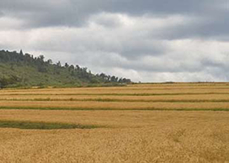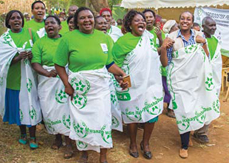Land Use and Development Farming viability in a changing landscape
 The world faces a resource management challenge which will require a renewed approach to communication, flexibility and understanding in planning and farm diversification, in order for farmers to remain financially viable and feed our growing global population.
The world faces a resource management challenge which will require a renewed approach to communication, flexibility and understanding in planning and farm diversification, in order for farmers to remain financially viable and feed our growing global population.
Agribusiness has a public relations issue which should be taken seriously by the industry as a whole. A discerning population is looking for choice, with a nostalgic image of farming which can no longer feed them, based on technological advances they do not understand or trust.
An anti-agribusiness movement has arisen which feeds consumers misleading information, and there is a mainstream media that celebrates shortcomings and hardships rather than achievements and successes. Confidence and trust in agribusiness is needed and this can only be achieved through improved communication. For farmers, a fair financial return on investment in a volatile market environment can be an issue, with many seeking expansion and scale to ensure viability. Technology is available to improve the utilisation of resources. However, these are poorly understood by a non-farming population, including planners, who often believe that scale and intensification is unnatural and leads to poor environmental, quality of life and animal welfare outcomes.
 For many in the agriculture industry around the world, an issue of significant concern is the sourcing of staff with the required skill set to assist in managing the operation of their farm businesses. In an environment of technological advancement, demographic shifts, urban-rural disconnect and increasing size, farm businesses struggle to access an appropriately trained and skilled workforce from which to source labour to fill the increasingly multifaceted roles on farm. In particular, the industry has a ‘missing middle’, with a dearth of talent to fill middle management roles that assist in both the decision-making process and the implementing of on farm operations.
For many in the agriculture industry around the world, an issue of significant concern is the sourcing of staff with the required skill set to assist in managing the operation of their farm businesses. In an environment of technological advancement, demographic shifts, urban-rural disconnect and increasing size, farm businesses struggle to access an appropriately trained and skilled workforce from which to source labour to fill the increasingly multifaceted roles on farm. In particular, the industry has a ‘missing middle’, with a dearth of talent to fill middle management roles that assist in both the decision-making process and the implementing of on farm operations. Soil health is the linchpin of the entire agricultural sector. As Lloyd Noble once said, “No civilization has outlived the usefulness of its soils. When the soil is destroyed, the nation is gone” (Noble Research Institute, 2017).
Soil health is the linchpin of the entire agricultural sector. As Lloyd Noble once said, “No civilization has outlived the usefulness of its soils. When the soil is destroyed, the nation is gone” (Noble Research Institute, 2017). OCP Group is a Moroccan state-owned company founded in 1920 and is one of the world’s leading manufacturer and exporter of phosphate fertilizers, phosphoric acid and phosphate rock. The Group boasts of 70% exclusive ownership of the world’s phosphate reserves and this has enabled the company to manufacture quality fertilizers to meet the needs of farmers for decades across the globe. The ownership of the world’s reserves is significant because phosphate is a key ingredient in crops production. For a century, OCP Group has expanded its operations and invested heavily in research and development to consistently innovate and transform agriculture. Currently, OCP has a global presence in more than 80 countries in five continents with a market share of 65% in Africa and North America. OCP Group generates approximately US$ 5 billion of annual revenues and employs more than 21,000 full time staff members.
OCP Group is a Moroccan state-owned company founded in 1920 and is one of the world’s leading manufacturer and exporter of phosphate fertilizers, phosphoric acid and phosphate rock. The Group boasts of 70% exclusive ownership of the world’s phosphate reserves and this has enabled the company to manufacture quality fertilizers to meet the needs of farmers for decades across the globe. The ownership of the world’s reserves is significant because phosphate is a key ingredient in crops production. For a century, OCP Group has expanded its operations and invested heavily in research and development to consistently innovate and transform agriculture. Currently, OCP has a global presence in more than 80 countries in five continents with a market share of 65% in Africa and North America. OCP Group generates approximately US$ 5 billion of annual revenues and employs more than 21,000 full time staff members. Lisa Tiang’a is more than just the Seed Category Lead, Africa and Middle East, Corteva Agriscience. She’s empowering farmers in the region to be the most powerful people of tomorrow, one lesson at a time.
Lisa Tiang’a is more than just the Seed Category Lead, Africa and Middle East, Corteva Agriscience. She’s empowering farmers in the region to be the most powerful people of tomorrow, one lesson at a time.